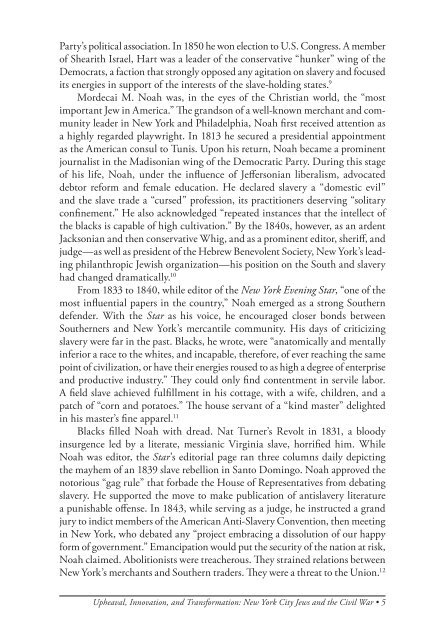American Jewish Archives Journal, Volume 64, Numbers 1 & 2
American Jewish Archives Journal, Volume 64, Numbers 1 & 2
American Jewish Archives Journal, Volume 64, Numbers 1 & 2
Create successful ePaper yourself
Turn your PDF publications into a flip-book with our unique Google optimized e-Paper software.
Party’s political association. In 1850 he won election to U.S. Congress. A member<br />
of Shearith Israel, Hart was a leader of the conservative “hunker” wing of the<br />
Democrats, a faction that strongly opposed any agitation on slavery and focused<br />
its energies in support of the interests of the slave-holding states. 9<br />
Mordecai M. Noah was, in the eyes of the Christian world, the “most<br />
important Jew in America.” The grandson of a well-known merchant and community<br />
leader in New York and Philadelphia, Noah first received attention as<br />
a highly regarded playwright. In 1813 he secured a presidential appointment<br />
as the <strong>American</strong> consul to Tunis. Upon his return, Noah became a prominent<br />
journalist in the Madisonian wing of the Democratic Party. During this stage<br />
of his life, Noah, under the influence of Jeffersonian liberalism, advocated<br />
debtor reform and female education. He declared slavery a “domestic evil”<br />
and the slave trade a “cursed” profession, its practitioners deserving “solitary<br />
confinement.” He also acknowledged “repeated instances that the intellect of<br />
the blacks is capable of high cultivation.” By the 1840s, however, as an ardent<br />
Jacksonian and then conservative Whig, and as a prominent editor, sheriff, and<br />
judge—as well as president of the Hebrew Benevolent Society, New York’s leading<br />
philanthropic <strong>Jewish</strong> organization—his position on the South and slavery<br />
had changed dramatically. 10<br />
From 1833 to 1840, while editor of the New York Evening Star, “one of the<br />
most influential papers in the country,” Noah emerged as a strong Southern<br />
defender. With the Star as his voice, he encouraged closer bonds between<br />
Southerners and New York’s mercantile community. His days of criticizing<br />
slavery were far in the past. Blacks, he wrote, were “anatomically and mentally<br />
inferior a race to the whites, and incapable, therefore, of ever reaching the same<br />
point of civilization, or have their energies roused to as high a degree of enterprise<br />
and productive industry.” They could only find contentment in servile labor.<br />
A field slave achieved fulfillment in his cottage, with a wife, children, and a<br />
patch of “corn and potatoes.” The house servant of a “kind master” delighted<br />
in his master’s fine apparel. 11<br />
Blacks filled Noah with dread. Nat Turner’s Revolt in 1831, a bloody<br />
insurgence led by a literate, messianic Virginia slave, horrified him. While<br />
Noah was editor, the Star’s editorial page ran three columns daily depicting<br />
the mayhem of an 1839 slave rebellion in Santo Domingo. Noah approved the<br />
notorious “gag rule” that forbade the House of Representatives from debating<br />
slavery. He supported the move to make publication of antislavery literature<br />
a punishable offense. In 1843, while serving as a judge, he instructed a grand<br />
jury to indict members of the <strong>American</strong> Anti-Slavery Convention, then meeting<br />
in New York, who debated any “project embracing a dissolution of our happy<br />
form of government.” Emancipation would put the security of the nation at risk,<br />
Noah claimed. Abolitionists were treacherous. They strained relations between<br />
New York’s merchants and Southern traders. They were a threat to the Union. 12<br />
Upheaval, Innovation, and Transformation: New York City Jews and the Civil War • 5
















